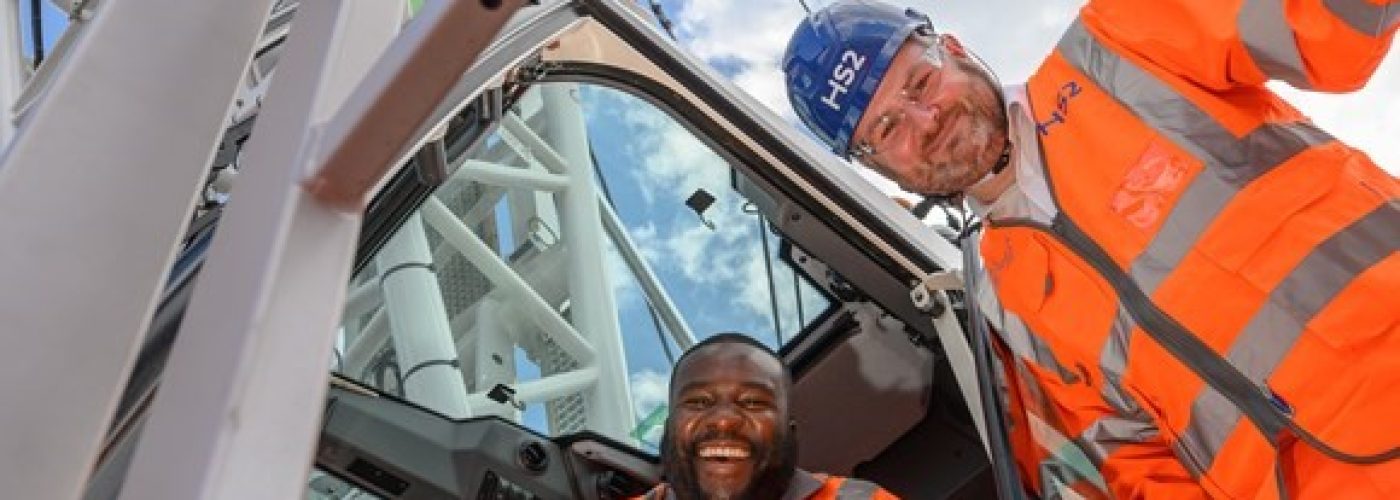Canterbury Road Vent Shaft site in South Kilburn becomes HS2 Ltd’s first completely diesel-free construction site
Major moment for the project in its journey towards net-zero carbon emissions by 2035
HS2 Ltd – the company building Britain’s new high speed, low carbon railway – has today [Thursday 12 May] announced its first completely diesel-free site is the Canterbury Road Vent Shaft site in South Kilburn, where HS2’s civils contractor Skanska Costain STRABAG joint venture (SCS JV) have introduced a range of diesel-free technologies and greener equipment.
Earlier this year, HS2 Ltd announced that the project aims to be net-zero carbon from 2035, with the target of achieving its first diesel-free construction site in 2022, and all of its construction sites being diesel-free by 2029.
HS2 Minister Andrew Stephenson said:
“HS2 is boosting transport across the UK, creating thousands of jobs and levelling up communities throughout the North and Midlands, all while leaving the environment better off than how we found it.
“This, the first of many diesel-free sites, is another example of how the country’s biggest infrastructure project not only delivers on its commitment to be Net Zero from 2035, but is a pioneer in leading the whole industry to cleaner, greener construction.”
Innovations on this site include one of the UK’s first 160 tonne emissions-free fully electric crawler cranes; the use of biofuels (Hydrogenated Vegetable Oil) to power plant and machinery on site; an electric compressor; and access to mains power on a 100% renewable energy tariff.
HS2’s Net Zero Carbon Plan sets out how HS2 will achieve new carbon reduction milestones, support the decarbonisation of the UK construction sector and reduce the carbon footprint of the programme. Other sites are set to follow suit, with innovations including retrofit technologies, biofuels, hydrogen and solar power helping to cut carbon across the whole of the route.
Peter Miller, HS2’s Environment Director said:
“We’re delighted to reach this key milestone in our Net Zero Carbon Plan. HS2 is playing a major role in the decarbonisation of the construction industry, collaborating with the industry and our supply chain to accelerate innovation in low-carbon technologies. Reducing emissions and improving air quality on HS2 construction sites is crucial for both the environment and surrounding communities.”
James Richardson, Managing Director of SCS said:
“We’re thrilled that Canterbury Road Vent Shaft has become the first diesel-free site on the HS2 project. We’re working hard with our supply chain to introduce renewable energy, green hydrogen and sustainable biofuels to help us remove diesel entirely from our sites by 2023.”
Innovations being trialled and introduced on other sites include:
- ‘Clean Air Gas Engine’ funded through Innovate UK and led by OakTec, which replaces diesel power with ultra-low (bio-LPG) emission engines in Advante Welfare units and standalone units.
- ‘EcoNet’ developed by Invisible Systems, Balfour Beatty and Sunbelt which controls and reduces energy output from key appliances, reducing power demand by 30%.
- Non-Road Mobile Machinery retrofit solutions which adds pollution control equipment onto older vehicles as an alternative to replacing the machine or the engine, reducing emissions.
- CESAR Emissions Compliance Verification which is a resilient system to show the EU Stage engine emission class of all construction plant.
- Proactive dust management solutions reducing impacts associated with on-site activities.
- Fully Electric Renewable Energy using solar and wind to power noise and air quality monitors, site security cameras and site briefing areas and solar pods powering sites by combining solar PV, battery storage and a back-up generator.
- Hydrogen Technology trials across sites considering both fuel-cell technology and combustible hydrogen solutions.





